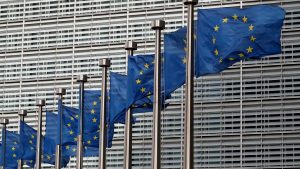 Brussels, November 15th, 2019 – The European Court of Justice ruled on Tuesday, November 12th, that EU law requires that products from Jewish settlements in the so-called West Bank cannot carry the label “Made in Israel” but must be labelled as a product originating from an “Israeli settlement”.
Brussels, November 15th, 2019 – The European Court of Justice ruled on Tuesday, November 12th, that EU law requires that products from Jewish settlements in the so-called West Bank cannot carry the label “Made in Israel” but must be labelled as a product originating from an “Israeli settlement”.
The ruling comes only two days after Jewish communities across Europe have commemorated the 81st anniversary of the “Kristallnacht” on November 9th – 10th, 1938, during which over 7000 Jewish businesses across Germany were marked, damaged, looted or completely destroyed.
In a statement on Thursday, November 14th, ECI Founding Director Tomas Sandell called the EU court ruling “counterproductive to peace and a gift to radical forces in Europe and the Middle East who want to isolate, boycott and delegitimize the State of Israel and demonize the Jewish people”.
When the European Commission, in November 2015, adopted an “interpretative notice” on the indication of origin of goods from the West Bank territories occupied by Israel since June 1967, it was said to be motivated by consumer protection. In this week´s ruling the court adds that this consumer information “could influence consumers’ purchasing decisions”, some of whom choose not to buy products because of “ethical considerations and considerations relating to the observance of international law”.
“This statement echoes calls from some of the darkest chapters of European history when the labelling of Jewish businesses with a Star of David was also seen as a form of consumer information”, said Sandell.
He then added: “The ruling sends the wrong message to European citizens at a time when antisemitism has reached alarming levels in the EU-member countries, and where the dispute between Israelis and Palestinians is seen as a catalyst for fuelling Jew hatred.” In a recent survey in Sweden, over 85 percent of those polled considered that the current Middle East conflict directly influenced how they view the domestic Jewish population.
“By insinuating that Israeli economic activities in the disputed territories are unethical, and require special labels, the EU helps fuel this sense of suspicion”, he noted.
Instead of promoting economic cooperation between Israelis and Palestinians, the EU seems to prefer to advance division by making industrial activities in the territories increasingly difficult. Following the “interpretative notice” from the European Commission in 2015, the Israeli company SodaStream had to relocate their factories from the disputed territories, leaving behind 600 unemployed Palestinians. It is estimated that up to 25,000 Palestinians are dependent for their livelihood on jobs in Israeli companies in the disputed territories of the West Bank.
“The court decision is a blow to these Palestinians and to all other moderate forces in the region who want to see business cooperation as a tool for peace and co-existence”, Sandell concluded.
The US State Department has expressed grave concern over the court decision in that it exposes an anti-Israel bias and encourages the Boycott, Divestment and Sanctions (BDS) movement.
Meanwhile a spokesperson for the European Commission defended its position by stating that “the EU rejects any form of boycott or sanctions against Israel.”
